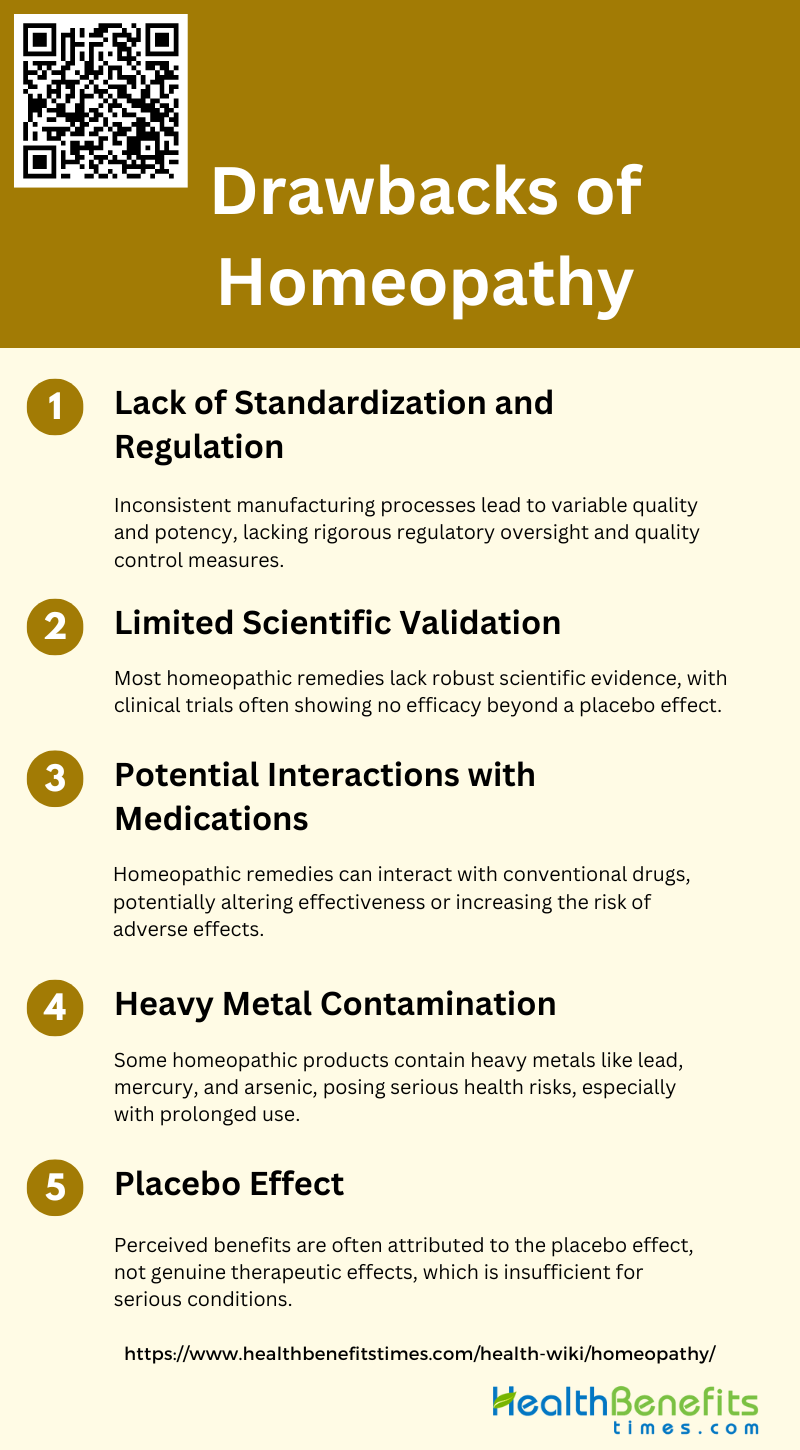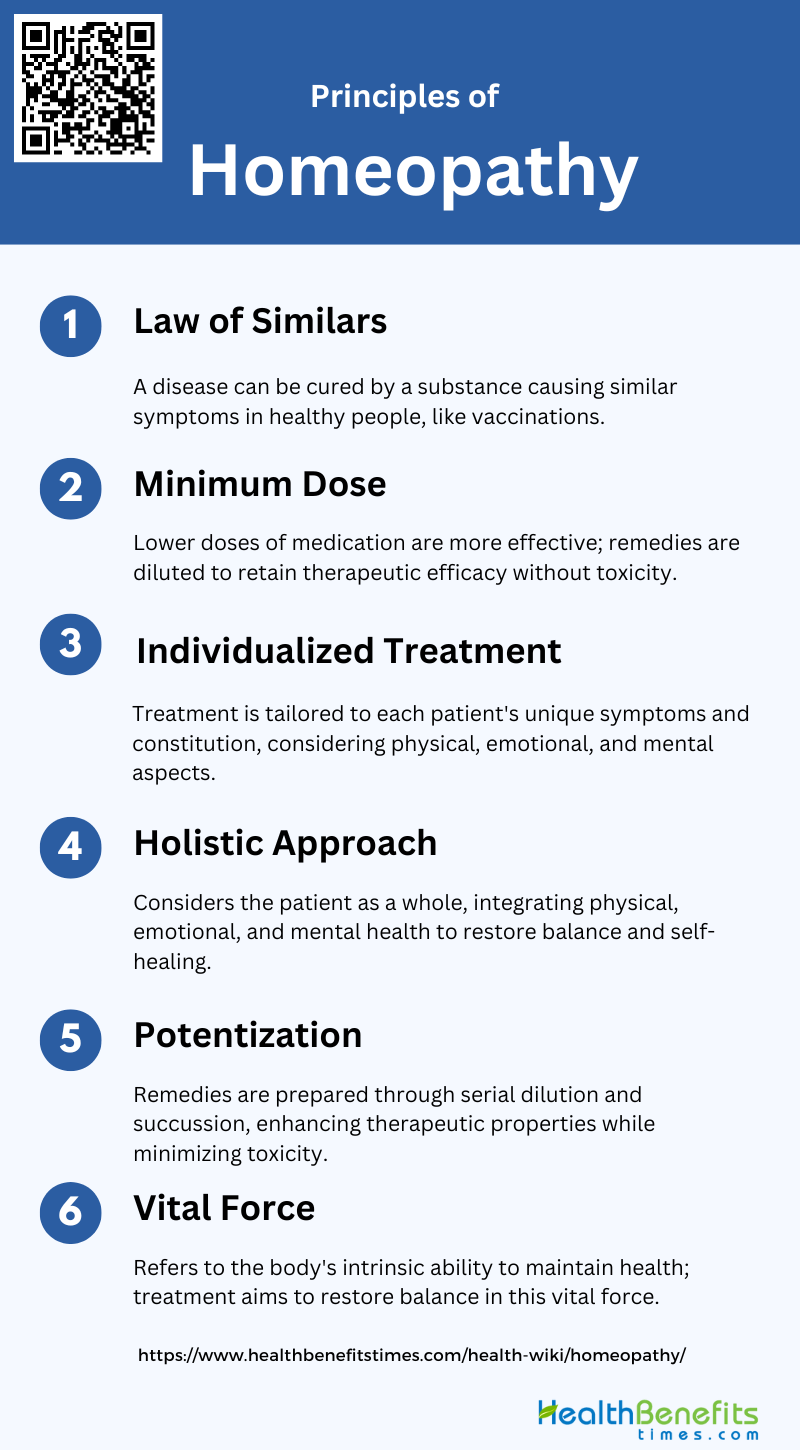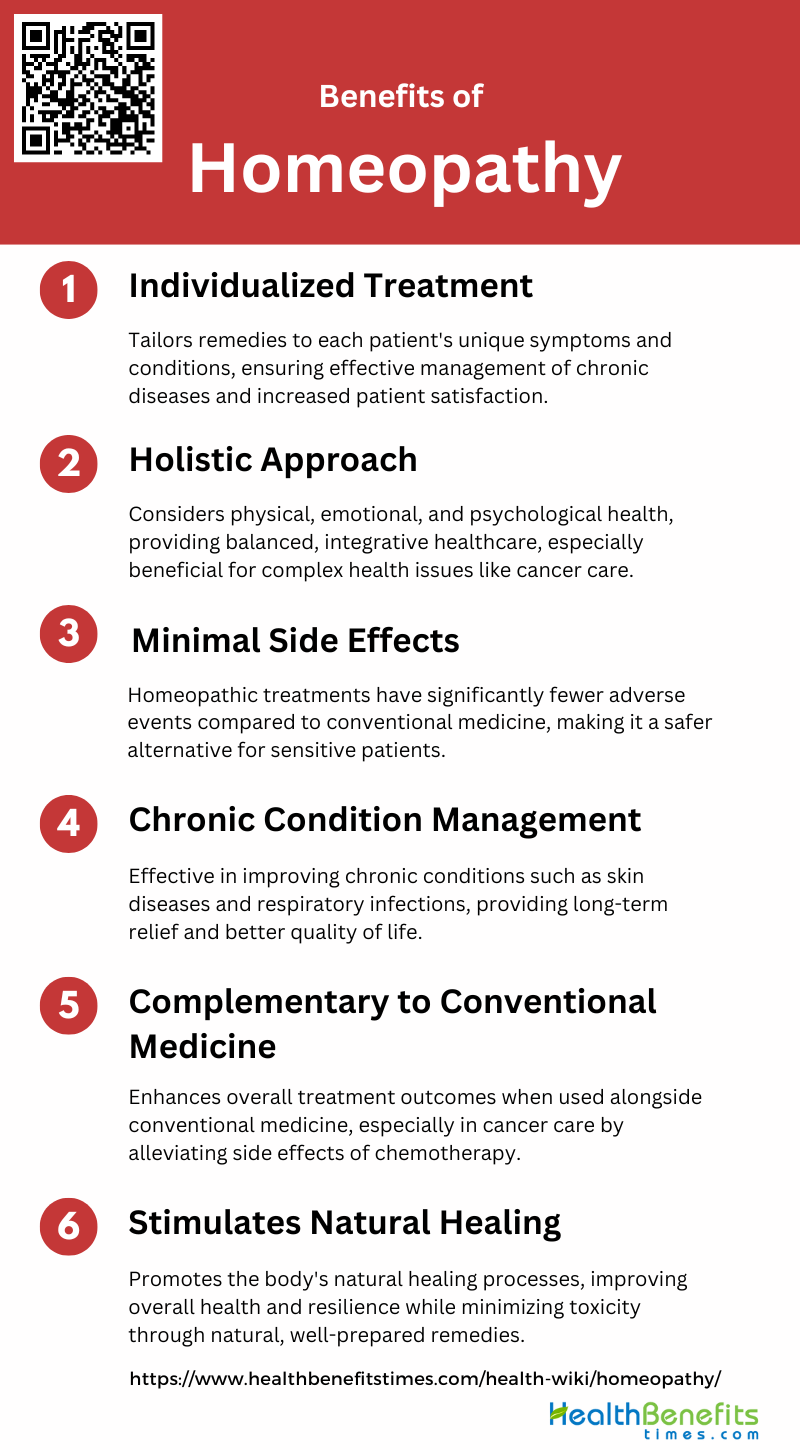 Homeopathy is based on the principle of “like cures like” (similia similibus curentur), where highly diluted substances that cause specific symptoms in healthy individuals are used to treat similar symptoms in sick individuals. The proposed mechanism behind homeopathy involves the concept of “water memory,” suggesting that water can retain the memory or imprint of the original substance even after extreme dilution. However, this concept is not supported by established scientific principles and remains controversial. Some researchers have proposed alternative explanations, such as the formation of nanoparticles or quantum effects, but these theories lack robust experimental evidence. Despite the lack of a widely accepted scientific explanation, homeopathy continues to be practiced and studied, with ongoing debates surrounding its efficacy and the need for rigorous research to evaluate its claims.
Homeopathy is based on the principle of “like cures like” (similia similibus curentur), where highly diluted substances that cause specific symptoms in healthy individuals are used to treat similar symptoms in sick individuals. The proposed mechanism behind homeopathy involves the concept of “water memory,” suggesting that water can retain the memory or imprint of the original substance even after extreme dilution. However, this concept is not supported by established scientific principles and remains controversial. Some researchers have proposed alternative explanations, such as the formation of nanoparticles or quantum effects, but these theories lack robust experimental evidence. Despite the lack of a widely accepted scientific explanation, homeopathy continues to be practiced and studied, with ongoing debates surrounding its efficacy and the need for rigorous research to evaluate its claims.
Brief history and origin of Homeopathy
Homeopathy, a system of alternative medicine, was founded by the German physician Samuel Hahnemann (1755-1843). Hahnemann coined the term “homeopathy” from the Greek words “homoios” (similar) and “pathos” (suffering), based on the principle of “like cures like”. This principle, although previously mentioned by Hippocrates and Paracelsus, was systematically developed by Hahnemann into a coherent medical practice. Homeopathy gained popularity in the 19th century, spreading from Europe to other parts of the world. In India, it was introduced in the early 19th century and became widely practiced, especially after the establishment of the Calcutta Homeopathic Medical College in 1881. The system also found its way to China in the late 19th century, primarily through Euro-American missionaries who were trained in homeopathic institutions. In the Americas, homeopathy reached the Southern Cone by the 1830s, facilitated by the movement of medical and lay practitioners between regions such as Rio de Janeiro and Buenos Aires. Despite its controversial standing within the broader medical community, homeopathy has persisted and evolved, maintaining a significant presence in various parts of the world.
How does homeopathy work?
The remedies are prepared through a process of serial dilution and succussion (vigorous shaking), which proponents believe imbues the solution with therapeutic properties, even when diluted beyond the point where any molecules of the original substance remain. Some studies suggest that homeopathy may improve quality of life and survival in patients with conditions such as non-small cell lung cancer when used alongside conventional treatments. However, the scientific community remains skeptical, often attributing any observed benefits to placebo effects. Despite this, homeopathy continues to be popular, particularly for its holistic approach and perceived safety. Further research is needed to fully understand the mechanisms and efficacy of homeopathic treatments.
What conditions does homeopathy treat?
Homeopathy has been used to treat a wide range of conditions. Below are the points about the conditions that homeopathy can potentially treat:
- Upper and Lower Respiratory Tract Complaints and Ear Complaints: Homeopathy is at least as effective as conventional medical care in treating upper and lower respiratory tract complaints, including allergies, and ear complaints.
- Attention Deficit/Hyperactivity Disorder (ADHD): There is little evidence for the efficacy of homeopathy in treating ADHD, with studies showing no significant treatment effects for core symptoms such as inattention, hyperactivity, or impulsivity. However, some studies suggest that homeopathy may have positive effects on behavioral and cognitive functions in ADHD patients.
- Rheumatoid Arthritis (RA): Homeopathy does not show significant improvement in symptoms of rheumatoid arthritis compared to placebo.
- Non-Small Cell Lung Cancer (NSCLC): Homeopathy, when used as an add-on therapy, may improve the quality of life and prolong survival in patients with non-small cell lung cancer.
- Acute Otitis Media in Children: Homeopathy may have a positive treatment effect in acute otitis media in children, although larger studies are needed to confirm these findings.
- Menopausal Symptoms in Breast Cancer Survivors: Homeopathy may improve the quality of life and general health in breast cancer survivors experiencing menopausal symptoms, although the evidence is not definitive.
Principles of Homeopathy
It is based on several core principles that guide its practice and application. Here are the fundamental principles of homeopathy:
1. Law of Similars
The Law of Similars, also known as “Similia similibus curentur” or “like cures like,” is the foundational principle of homeopathy. It posits that a disease can be cured by a substance that produces similar symptoms in healthy individuals. This principle dates back to ancient times and was formalized by Samuel Hahnemann in the late 18th century. Hahnemann discovered that Cinchona bark, which caused malaria-like symptoms in healthy people, could treat malaria. This principle is akin to the concept of vaccination, where a small dose of a pathogen stimulates the body’s defense mechanisms.
2. Minimum Dose
The principle of Minimum Dose in homeopathy asserts that the lower the dose of the medication, the greater its effectiveness. Homeopathic remedies are often diluted to the point where no molecules of the original substance remain, yet they are believed to retain therapeutic efficacy. This process, known as potentization, involves serial dilution and succussion (vigorous shaking). Hahnemann developed this method to reduce toxicity and enhance the remedy’s healing properties. Despite skepticism due to the extreme dilutions, many homeopaths report clinical effectiveness of these high-potency remedies.
3. Individualized Treatment
Individualized Treatment is a core tenet of homeopathy, emphasizing that treatment should be tailored to the unique symptoms and constitution of each patient rather than the disease itself. Homeopaths conduct detailed patient histories to understand the totality of symptoms, including physical, emotional, and mental aspects. This personalized approach ensures that the selected remedy closely matches the patient’s specific symptom profile, leading to more effective treatment outcomes. This principle complicates clinical research but is central to homeopathic practice.
4. Holistic Approach
The Holistic Approach in homeopathy considers the patient as a whole, integrating physical, emotional, and mental health. Homeopathy aims to restore balance and stimulate the body’s self-healing mechanisms. This approach contrasts with conventional medicine, which often focuses on treating specific symptoms or diseases. By addressing the underlying imbalances and promoting overall well-being, homeopathy seeks to achieve long-term health improvements. This holistic perspective is particularly beneficial in managing chronic conditions and enhancing the patient’s quality of life.
5. Potentization
Potentization is the process of preparing homeopathic remedies through serial dilution and succussion. This method is believed to enhance the remedy’s therapeutic properties while minimizing toxicity. Each dilution step is accompanied by vigorous shaking, which is thought to imprint the energetic essence of the original substance onto the diluent. Despite the lack of detectable molecules in highly potentized remedies, homeopaths argue that these preparations retain biological activity and can stimulate the body’s healing response. This concept remains controversial but is a cornerstone of homeopathic practice.
6. Vital Force
The concept of Vital Force in homeopathy refers to the body’s intrinsic ability to maintain health and self-regulate. Homeopaths believe that disease arises from disturbances in this vital force, and treatment aims to restore its balance. Remedies are selected to stimulate the vital force, promoting healing from within. This principle aligns with the holistic and individualized nature of homeopathy, emphasizing the importance of treating the patient as a whole rather than focusing solely on symptoms. The vital force is central to understanding how homeopathic treatments work.
Benefits of Homeopathy
It is known for its holistic approach, minimal side effects, and personalized treatment plans. Here are some key benefits of homeopathy:
1. Individualized Treatment
This method is particularly beneficial in managing chronic conditions where conventional treatments may fall short. For instance, a study on chronic skin diseases demonstrated that individualized homeopathic treatments led to significant improvements in patients’ conditions, including reductions in itchiness and sleep disturbances, and enhanced overall satisfaction in daily life. This personalized approach ensures that the treatment is specific to the patient’s needs, potentially increasing its effectiveness and patient satisfaction.
2. Holistic Approach
Homeopathy adopts a holistic approach to treatment, considering the physical, emotional, and psychological aspects of a patient’s health. This comprehensive method is evident in its application in cancer care, where homeopathy not only aims to alleviate physical symptoms but also to improve the overall quality of life and emotional well-being of patients. By addressing the whole person rather than just the disease, homeopathy can provide a more balanced and integrative form of healthcare, which is particularly beneficial for patients dealing with complex, multifaceted health issues.
3. Minimal Side Effects
One of the significant advantages of homeopathy is its minimal side effects, making it a safer alternative or complementary option to conventional medicine. Studies have shown that homeopathic treatments result in fewer adverse events compared to conventional treatments. For example, in a comparative study of homeopathy and conventional medicine for respiratory and ear complaints, the adverse event rate was significantly lower in the homeopathy group (7.8%) compared to the conventional medicine group (22.3%). This lower risk profile makes homeopathy an attractive option for patients who are sensitive to or wish to avoid the side effects of conventional drugs.
4. Chronic Condition Management
Research indicates that homeopathic treatments can lead to significant improvements in chronic conditions such as skin diseases and respiratory infections. For instance, a study on chronic skin diseases reported that 88.3% of patients experienced over 50% improvement in their conditions with homeopathic treatment. Similarly, homeopathy has been effective in managing chronic respiratory conditions, providing relief and improving patients’ quality of life. These findings suggest that homeopathy can be a valuable tool in the long-term management of chronic illnesses.
5. Complementary to Conventional Medicine
In cancer care, for example, homeopathy has been used to alleviate the side effects of conventional treatments like chemotherapy and radiation, thereby improving patients’ quality of life and potentially extending survival times. The non-interfering nature of homeopathic remedies allows them to be safely combined with conventional treatments, providing a holistic and integrative approach to patient care. This complementary use underscores the versatility and adaptability of homeopathy in modern medical practice.
6. Stimulates Natural Healing
Homeopathy is based on the principle of stimulating the body’s natural healing processes. This approach is particularly beneficial in conditions where the body’s self-regulatory mechanisms need support. For instance, homeopathic treatments have been shown to improve global health status and subjective well-being in cancer patients by enhancing their natural healing responses. The remedies used in homeopathy, derived from natural sources, are prepared in a way that maximizes their therapeutic potential while minimizing toxicity. This stimulation of natural healing processes not only addresses the symptoms but also promotes overall health and resilience.
Drawbacks of Homeopathy
While homeopathy is popular for its holistic approach and minimal side effects, it is not without its drawbacks. These can include a lack of scientific evidence, potential delays in receiving effective treatment, and variability in practitioner expertise. Here are some key drawbacks to consider:
1. Lack of Standardization and Regulation
Unlike conventional medications, homeopathic remedies are not subject to rigorous regulatory oversight and quality control measures. This lack of regulation raises concerns about the safety, efficacy, and consistency of these products across different manufacturers and batches.
2. Limited Scientific Validation
Many homeopathic remedies lack robust scientific evidence to support their claimed therapeutic effects. While some preliminary studies have been conducted, the overall scientific validation of homeopathy remains limited. Most well-designed clinical trials have failed to demonstrate the efficacy of homeopathic remedies beyond a placebo effect. The lack of scientific validation raises doubts about the therapeutic value of these remedies.
3. Potential Interactions with Medications
Homeopathic remedies may interact with conventional medications, potentially altering their effectiveness or increasing the risk of adverse effects. Some homeopathic products have been found to contain active pharmaceutical ingredients or contaminants that can interact with prescribed medications, leading to harmful consequences for patients.
4. Heavy Metal Contamination
Several studies have reported the presence of heavy metals, such as lead, mercury, and arsenic, in some homeopathic remedies. These contaminants can pose serious health risks, particularly with prolonged use or in vulnerable populations like children and pregnant women. Heavy metal contamination is a significant concern due to the lack of standardization and quality control in the manufacturing of homeopathic products.
5. Placebo Effect
Many proponents of homeopathy attribute the perceived benefits of these remedies to the placebo effect, where patients experience improvements due to their belief in the treatment rather than the actual therapeutic effects of the remedy itself. While the placebo effect can be beneficial in some cases, it should not be mistaken for a genuine medical treatment, especially for serious or life-threatening conditions.
6. Delayed Diagnosis and Treatment
Reliance on homeopathic remedies as a sole treatment for serious medical conditions can delay proper diagnosis and effective conventional treatment. This delay can lead to the progression of the underlying condition and potentially worsen the patient’s prognosis. Homeopathy should not be used as a substitute for evidence-based medical care, particularly in cases of severe or chronic illnesses.



